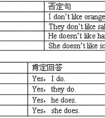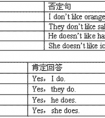句型转换。1. They find their schoolbags under the tree.(变否定句) They _________ _________ their schoolbags under the tree. 2. I have my lunch at school. (变-七年级英语
题文
| 句型转换。 |
| 1. They find their schoolbags under the tree.(变否定句) They _________ _________ their schoolbags under the tree. 2. I have my lunch at school. (变一般疑问句) ________ you _________ your lunch at school? 3. The robot(机器人)doesn't read well. (变为肯定句) The robot _______ _______. 4. Beijing Zoo has many animals. (变为同义句) ______ ______ many animals _____ Beijing Zoo. 5. It is sunny today. (对划线部分提问) _________ _________ _________ like today? |
答案
| 1. don't find 2. Do; have 3. reads well 4. There are; in 5. What's the weather |
据专家权威分析,试题“句型转换。1. They find their schoolbags under the tree.(变..”主要考查你对 实义动词,副词,助动词,there be 句型,一般疑问句 等考点的理解。关于这些考点的“档案”如下:
实义动词副词助动词there be 句型一般疑问句
考点名称:实义动词
- 实意动词:
即行为动词,表示动作的动词。实义动词与系动词是相对的,能独立用作谓语。
它分为及物动词和不及物动词两种:
及物动词是指后面要求有直接宾语的动词;
不及物动词指后面不需要跟宾语的动词。 实意动词使用方法:
及物动词
后面必须跟宾语意义才完整的实义动词,叫做及物动词(transitive verb)。如:
I believe that the committee will consider our suggestion.我相信委员会将会考虑我们的建议。
“How long can I keep the book ?”Harry asked.哈里问:“这本书我可以借多久?”
Dr. Bethune set us a good example. 白求恩大夫给我们树立了好榜样。
Crude oil contains many useful substances.原油含有许多有用的物质。
不及物动词
本身意义完整后面不须跟宾语的实义动词,叫做不及物动词(intransitive verb)。如:
Birds fly.鸟会飞。
It happened in June 1932.这件事发生于一九三二年六月。
My watch stopped.我的表停了。
She spoke at the meeting yesterday evening. 她在昨天晚上的会上发了言。
兼作及物动词和不及物动词
英语里有不少实义动词可以兼作及物动词和不及物动词。这样的动词又有两种不同的情况
a)兼作及物动词和不及物动词时,意义不变。试比较:
Shall I begin at once?我可以立刻开始吗?(begin作不及物动词)
She began working as a librarian after she left school.她毕业后当图书馆管理员。(began作及物动词)
When did they leave Chicago?他们是什么时候离开芝加哥的?(leave 作及物动词)
They left last week. 他们是上周离开的。(left 作不及物动词)
b)兼作及物动词和不及物动词时,有时意义不尽相同。如:
Wash your hands before meals.饭前要洗手。
Does this cloth wash well? 这布经得起洗吗?- 英汉实意动词用法比较:
与汉语的比较,有时英语动词的及物和不及物的用法,与汉语的用法不一样,请注意下列两种情况:
a)有的动词在英语里只能用作不及物动词,而汉语则可用作及物动词,如arrive到达,agree同意,listen听。英语里这些动词后面常接介词。如:
We arrived at the railway station at noon.
我们于中午到达火车站。(at不能省去)
(比较:We reached the railway station at noon.)
Everybody listened to the lecture with great interest.
每个人都很有兴趣地听讲课。(to不可省去)
(比较:We all heard the lecture.)
Do they agree to the plan?他们同意这个计划吗?(to不可省去)
b)有的动词在英语里能用作及物动词,而在汉语里则不能用作及物动词,如serve为…服务。
Our children are taught to serve the people wholeheartedly.
我们的儿童被教以全心全意为人民服务
用于be动词之后,实义动词之前。 实意动词的用法:
肯定句:
主语+动词过去式+其它
否定句:
主语+助动词didn‘t+动词原型+其他
一般过去式:
Did+主语+动词原型+其他
考点名称:副词
- 副词:
是一种用来修饰动词、形容词、全句的词,说明时间、地点、程度、方式等概念的词。副词是一种半虚半实的词。
副词可分为:地点副词、方式副词、程度副词、疑问副词和连接副词。
副词连用顺序:程度副词+方式副词+地点副词+时间副词。 副词分类:
1、时间副词有三类:always, often, usually, sometimes, never, ever, hardly等一般位于系动词、情态动词和助动词之后,实之前义动词
1)表示发生时间的副词:
It’s beginning to rain now! 现在开始下雨了!
2)表示频繁程度的副词,也称频度副词always, often, usually, sometimes, never, ever, hardly等一般位于系动词、情态动词和助动词之后,实之前义动词:
She often changes her mind. 她常改变主意。
3)还有一些其他表示时间的副词:
He has just had an operation. 他刚动过手术。
2、地点副词:
1)有不少表示地点的副词:
She is studying abroad. 她在国外留学。
2)还有一些部分与介词同形的副词。它们与介词同形,跟宾语的是介词,否则是副词:
①用作介词:Stand up! 起立!
②用作副词:A cat climbed up the tree. 猫爬上了树。
3)以where 构成的副词也是地点副词:
It’s the same everywhere. 到处都一样。
3、方式副词:
carefully, properly(适当地), anxiously(焦虑地), suddenly, normally(正常地), fast, well, calmly(冷静地), politely(有礼貌地), proudly(自豪地), softly, warmly ,slowly
4、程度副词:
much,little, very,rather(相当),so,too,still, quite, perfectly(完美地), enough, extremely(非常), entirely(整个),almost, slightly(细小地), hardly.
5、疑问副词:
how, when, where, why.
6、关系副词:
when, where, why.等。
7、 连接副词:
therefore(因此),moreover(此外),however,otherwise(另外的),then,when ,where,how,why等。副词的语法作用:
副词在句中可作状语,表语,补语,定语。
He works hard. (作状语)
他工作努力。
You speak English very well. (作状语)
你英语讲的相当好。
Is she in ? (作表语)
她在家吗?
Let's be out. (作表语)
让我们出去吧。
Food here is hardly to get. (here作定语,hardly作状语)
这儿很难弄到食物。
Let him out!(作补语)
让他出去!
修饰名词的副词放在被修饰词之后
a. The villagers there are busy getting in wheat.不同类型副词的用法比较:
方式副词:
1)英语中有大量方式副词,说明行为方式(回答how的问题):
How beautifully your wife dances. 你夫人舞跳的真美。
2)还有相当多的副词,表示某些情绪:
She smiled gratefully. 她感激的笑了笑。
3)还有一些以-ly结尾的副词,表示动作发生的状况:
He left the town secretly. 他悄然离开了这座城市。
程度副词和强调副词 :
1)程度副词可修饰动词,表示“到某种程度”: Is she badly hurt? 她伤得重吗?
- 最新内容
- 相关内容
- 网友推荐
- 图文推荐
| [家长教育] 孩子为什么会和父母感情疏离? (2019-07-14) |
| [教师分享] 给远方姐姐的一封信 (2018-11-07) |
| [教师分享] 伸缩门 (2018-11-07) |
| [教师分享] 回家乡 (2018-11-07) |
| [教师分享] 是风味也是人间 (2018-11-07) |
| [教师分享] 一句格言的启示 (2018-11-07) |
| [教师分享] 无规矩不成方圆 (2018-11-07) |
| [教师分享] 第十届全国教育名家论坛有感(二) (2018-11-07) |
| [教师分享] 贪玩的小狗 (2018-11-07) |
| [教师分享] 未命名文章 (2018-11-07) |


![How much does it ______ to fly from Yancheng to Hainan Island?[ ]A. cost B. payC. spend D. take-七年级英语](http://www.00-edu.com/d/file/ks/4/2/shiyidongci/2020-01-05/small7dcf2f05998de63e10cc3629787031c81578210087.png)

![He always _____TV in the evening. He _____ listening to the radio. [ ]A. watch, don't like B. watches, doesn't like C. watching, don't like D. watch, do-七年级英语](http://www.00-edu.com/d/file/ks/4/2/shiyidongci/2020-01-05/small45d599b4a60b84e61cec210bfbf051f51578214524.png)
![I'd rather ___ to the Mcdonald's Restaurant because I like to listen to quiet music.[ ]A. to go B. going C. go D. went-八年级英语](http://www.00-edu.com/d/file/ks/4/2/shiyidongci/2020-01-05/small1767bba1727fef2c035c53dcbd9bc20e1578209517.png)
